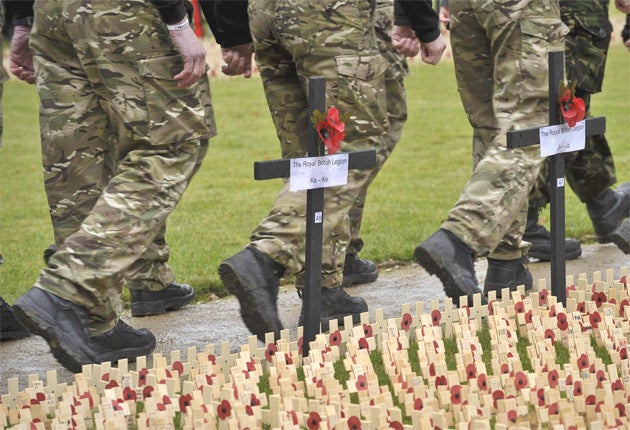Soldiers struggle to cope with post-Afghanistan life

Your support helps us to tell the story
From reproductive rights to climate change to Big Tech, The Independent is on the ground when the story is developing. Whether it's investigating the financials of Elon Musk's pro-Trump PAC or producing our latest documentary, 'The A Word', which shines a light on the American women fighting for reproductive rights, we know how important it is to parse out the facts from the messaging.
At such a critical moment in US history, we need reporters on the ground. Your donation allows us to keep sending journalists to speak to both sides of the story.
The Independent is trusted by Americans across the entire political spectrum. And unlike many other quality news outlets, we choose not to lock Americans out of our reporting and analysis with paywalls. We believe quality journalism should be available to everyone, paid for by those who can afford it.
Your support makes all the difference.Greater numbers of soldiers are returning from Afghanistan with mental health problems.
As the country falls silent this morning to mark Armistice Day, veterans charities and health professionals warn that the number of patients being treated after serving in Britain's ongoing conflict is at an all-time high. A significant minority attempt to self-medicate using alcohol or drugs, become homeless or get into trouble and receive prison sentences.
The youngest patient being seen by the charity Combat Stress is aged 20. Despite the Afghanistan and Iraq wars beginning less than a decade ago, about 600 soldiers have already approached the charity seeking treatment for post-traumatic-stress disorder. The true number is likely to be much higher, with the average time taken for soldiers to report symptoms being 14 years.
In the past year, 56 soldiers who have served in Afghanistan and 143 Iraq veterans have approached Combat Stress. The number of soldiers from each war now receiving treatment for stress-related illnesses from the charity is 129 from Afghanistan and 460 from Iraq. And they are the ones who seek help.
Figures from the ministries of Justice and Defence estimate that about 2,500 veterans are in prison – about 3.5 per cent of the total prison population in England and Wales.
However, the National Association of Probation Officers claims that across the UK there are 8,500 military veterans in custody – about 8 per cent of the prison population. Its figures suggest there are another 12,000 veterans on probation or parole.
Tony Wright, a former soldier who now runs About Turn CIC, a social enterprise that aims to improve the lives of ex-service personnel, said: "Most soldiers who come out of the forces make the transition to normal life quite easily, but there is about 5 per cent who do not and those are the ones being failed by the system.
"There is no proper exit route for these people. There is no mechanism to help them find employment or housing and that makes it very difficult for people who are already suffering from what they may have done and seen.
"I once heard someone say that when you go into the army they take the civilian out of you and make you into a soldier, but when you come out they don't put the civilian back in. I think that sums it up perfectly."
Combat Stress, in association with Help for Heroes, will today open a new wing at its Tyrwhitt House treatment centre in Surrey. A spokesman for the charity said: "The fact that the average reporting time is over 14 years shows that the Iraq and Afghanistan generation are coming forward with their problems much earlier.
"Last year we had six people come forward more than 50 years after they had been discharged from the armed forces."
Some former soldiers say that the support the Government offers is not good enough. Last year Lance Corporal Johnson Beharry, the Army's most decorated serving war hero, said soldiers suffering from mental trauma resulting from combat in Iraq and Afghanistan were being failed by the Government. L/Cpl Beharry, who received the Victoria Cross for twice saving the lives of colleagues in Iraq while under heavy rocket fire, said veterans had to rely on military charities to get treatment.
Andrew Robathan, the Minister for Defence Personnel, Welfare and Veterans, said: "After leaving the services, the vast majority build successful civilian lives.... Sadly, a minority do struggle."
Join our commenting forum
Join thought-provoking conversations, follow other Independent readers and see their replies
Comments